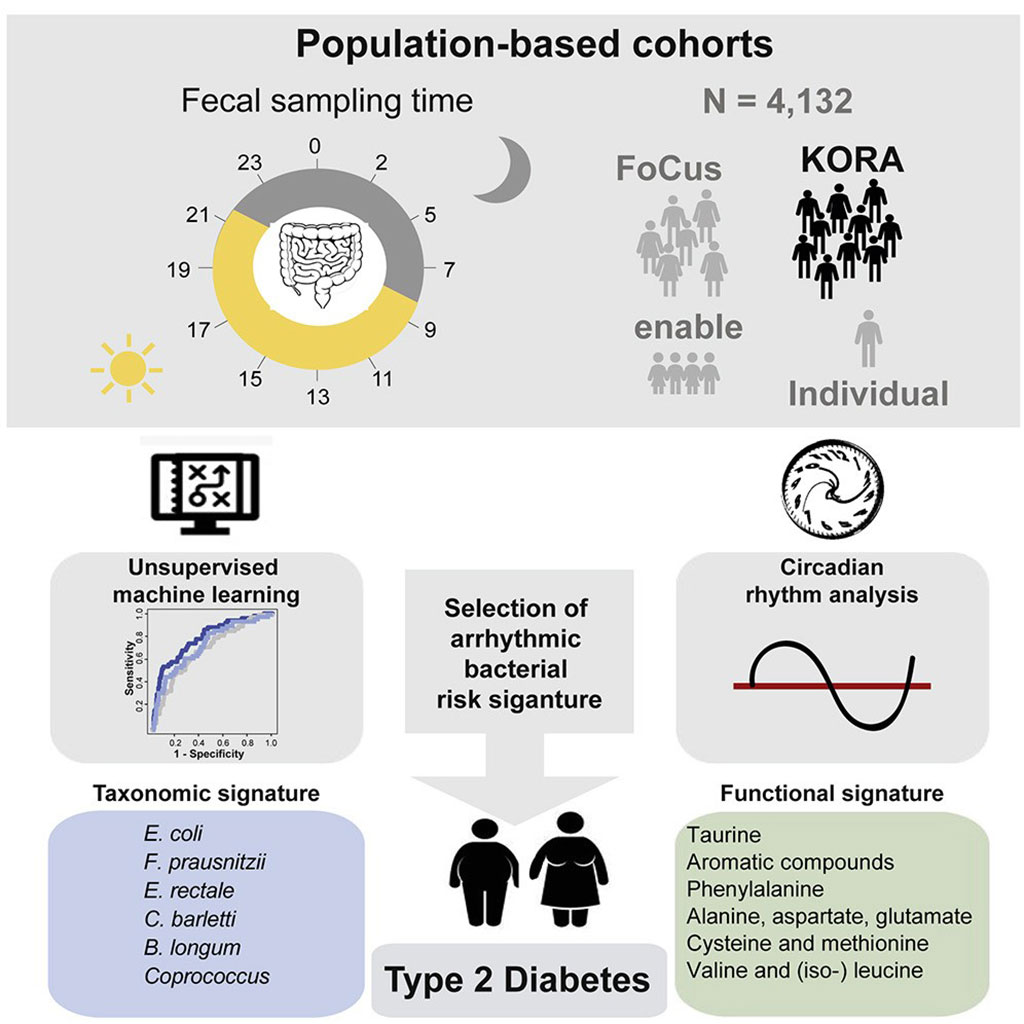Type 2 Diabetes Associated with Arrhythmic Daily Gut Microbe
By LabMedica International staff writers
Posted on 16 Jul 2020
Type 2 diabetes (T2D), formerly known as adult-onset diabetes, is a form of diabetes that is characterized by high blood sugar, insulin resistance, and relative lack of insulin. Common symptoms include increased thirst, frequent urination, and unexplained weight loss.Posted on 16 Jul 2020
Several studies found that obesity-related changes in the gut microbiota are associated with low grade inflammation, which supports a close link between the immune and metabolic systems throughout the gut microbiota. There are several mechanisms that relate microbiota to the onset of insulin resistance and diabetes, including changes in bowel permeability, endotoxemia, interaction with bile acids, changes in the proportion of brown adipose tissue.

Image: Arrhythmic Gut Microbiome Signatures Predict Risk of Type 2 Diabetes (Photo courtesy of Technical University of Munich).
A large team of scientists collaborating with the Technical University of Munich (Freising, Germany) used high-throughput 16S ribosomal RNA gene sequencing to profile gut microbial community composition in fecal samples from 1,976 individuals from Germany enrolled in the prospective KORA population study, detecting distinct levels of specific pathogens across the day in individuals with available time of defecation data.
By analyzing the diurnal gut microbiome dynamics, the team noted that individuals that had T2D or were obese appeared to lose gut oscillations that involved changes in microbiome levels of dozens of gut bacteria. The authors noted that while both obesity and T2D coincided with altered gut microbiome oscillations during the span of a day, there were differences in the operational taxa units involved, hinting that weight contributes to T2D risk stratification independent of disrupted circadian rhythms in the microbiome. Shotgun metagenomic analysis functionally linked 26 metabolic pathways to the diurnal oscillation of gut bacteria.
The team went on to verify the 24-hour gut microbe rhythms in nearly 1,400 more German participants sampled at multiple time points. They also used an unsupervised machine learning method to focus in on a set of 13 oscillating gut bacteria with circadian patterns that are upset in individuals with T2D. The bacterial signature showed promise for finding and predicting T2D cases in a subset of 699 participants from the KORA cohort, while additional metagenomic sequence data for a subset of 50 study participants with or without T2D or pre-diabetes, each tested twice five years apart, provided a window into some of the gut microbe genes and pathways that are altered when metabolic disease-related microbe oscillations are upended.
Dirk Haller, PhD, holds the Chair of Nutrition and Immunology and is the senior author of the study, said, “We demonstrated that loss of circadian rhythmicity affects microbiome features related to the onset and progression of T2D and identified bacterial signatures for metabolic risk profiling in human populations.”
The authors concluded that it may be important to take circadian gut microbe oscillations into account to better understand the underlying mechanisms of disease-associated microbiome alterations and to validate risk profiles in prospective cohorts. The study was published on July 2, 2020 in the journal Cell Host & Microbe.
Related Links:
Technical University of Munich













